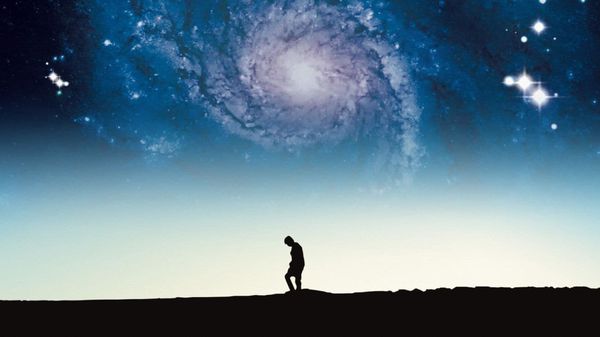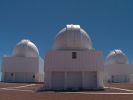Eye For Film >> Movies >> Nostalgia For The Light (2010) Film Review
Nostalgia For The Light
Reviewed by: Jennie Kermode

By the time this review reaches you it will have been hours, days, perhaps even months since I wrote it. In reading it you are looking back in time. Yet there is also a subtler timeshift going on that you might not be aware of. In the time it takes for the light from your screen to reach your eyes, time has also passed. There is no present. Everything we see is already disappearing into the past.
The vast Atacama desert in Chile is a place where time seems to stand still. The only place on Earth with zero humidity - the brown spot you can see on pictures taken from space - it's the perfect place for studying astronomy, its thin cloud-free air offering unrivalled views of the stars. Here scientists use giant telescopes to peer back into the past, hoping to uncover the secrets of the Big Bang. They see themselves as archaeologists exploring a universe which, by the time its light reaches them, has already undergone thousands of years of further change.

Elsewhere in the desert, archaeologists of a more traditional kind are at work. This dry climate preserves the dead like nowhere else. Every now and again ancient mummies are discovered, mostly traders who died whilst leading their llamas across the plains. Their woollen clothes still have their bright colours though their skin has often been torn away by the wind. Atacama is a portal into South America's distant past.
Then there is another kind of mummy. Under the brutal regime of dictator Augusto Pinochet, thousands of people were 'disappeared'. Some were dumped at sea, but some were buried in the desert. Many of the bodies have never been found. Chilean women still walk the desert looking for them. Though most are now nearing the end of their lives, they feel they cannot rest until they discover what has become of their loved ones.
These three subjects - the recent past, the ancient past, and the scarcely imaginable gulfs of time that can be glimpsed through space - make for such compelling contrasts that director Patricio Guzmán has wisely chosen to step back and let the story unfold largely by itself. His brief introductory narrative places the film in a personal context; his lingering shots of the open desert and the wide, clear skies help to capture the emotional experience of being there. Dazzling shots of distant galaxies help viewers without a background in astronomy to understand something of the appeal of the heavens even if they find it hard to understand the work taking place. That work is not well explained and the astronomy strand is probably the weakest of the three, but Guzmán has managed to capture some powerful interviews which link his themes impressively, and throughout we can take pleasure in the company of people whose individual brilliance has drawn them to what is ultimately a single quest, the quest for understanding.
Perhaps just a little too dry for a general audience, Nostalgia For The Light will be difficult viewing for those who experienced personal loss due to the Pinochet regime, but it has some powerfully uplifting moments, most notably when former concentration camp inmates describe how looking at the stars enabled them to stay sane and to feel free. Prisons work, psychologically, because they break down inmates' awareness that they are living within a larger time and space. If you feel trapped within the confines of your own life, Nostalgia For The Light can offer you a new perspective.
Reviewed on: 26 Feb 2011
















